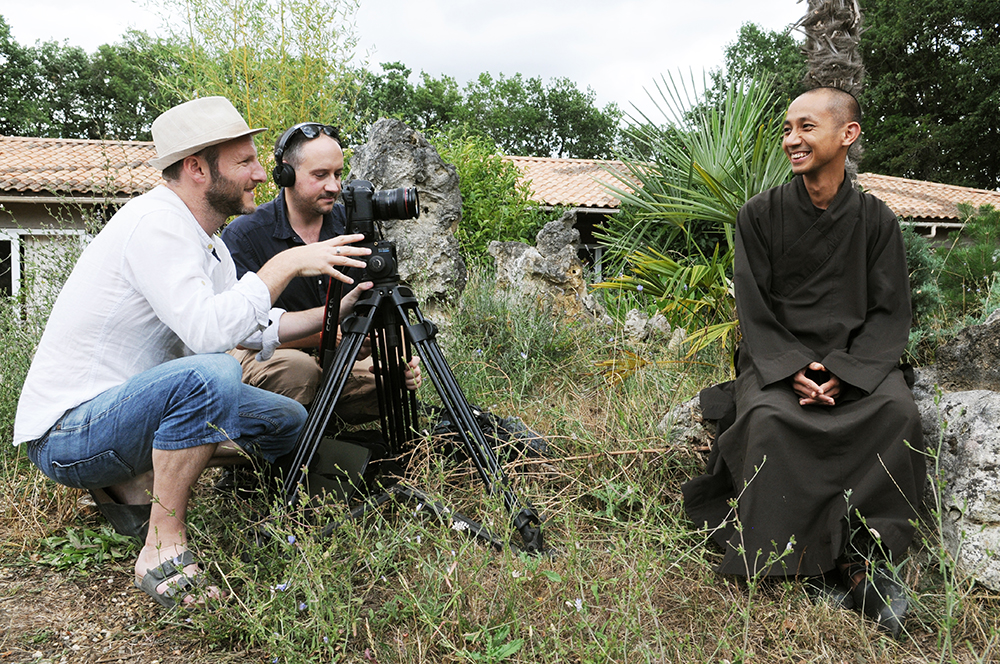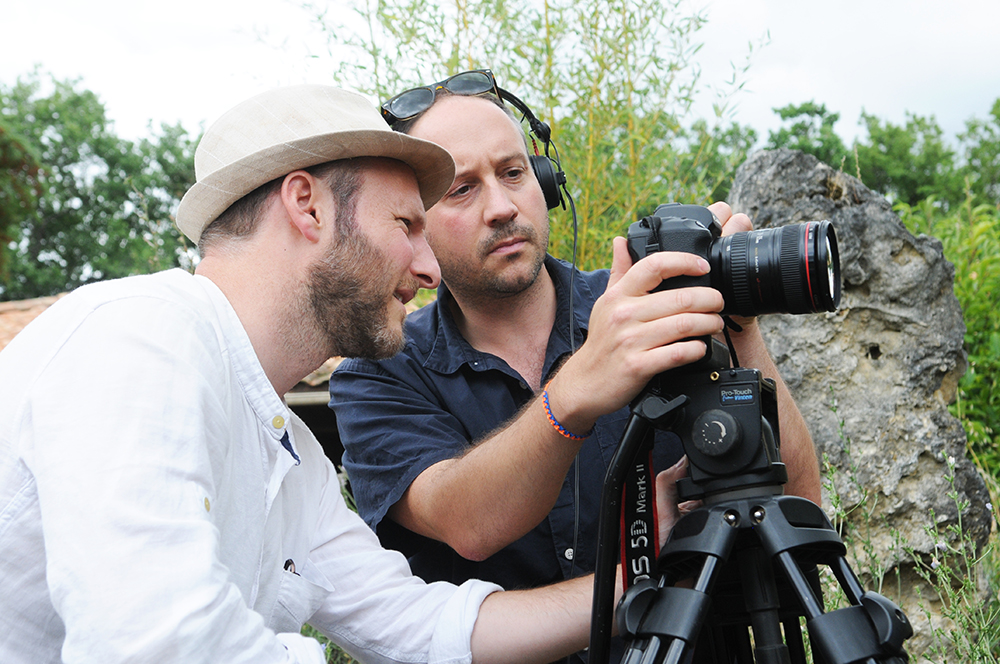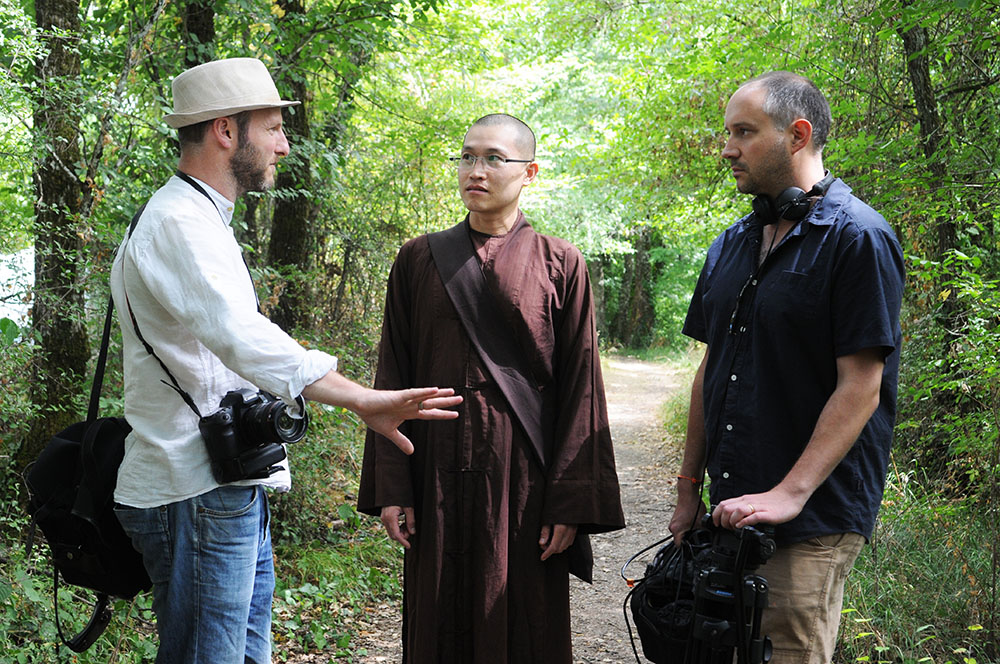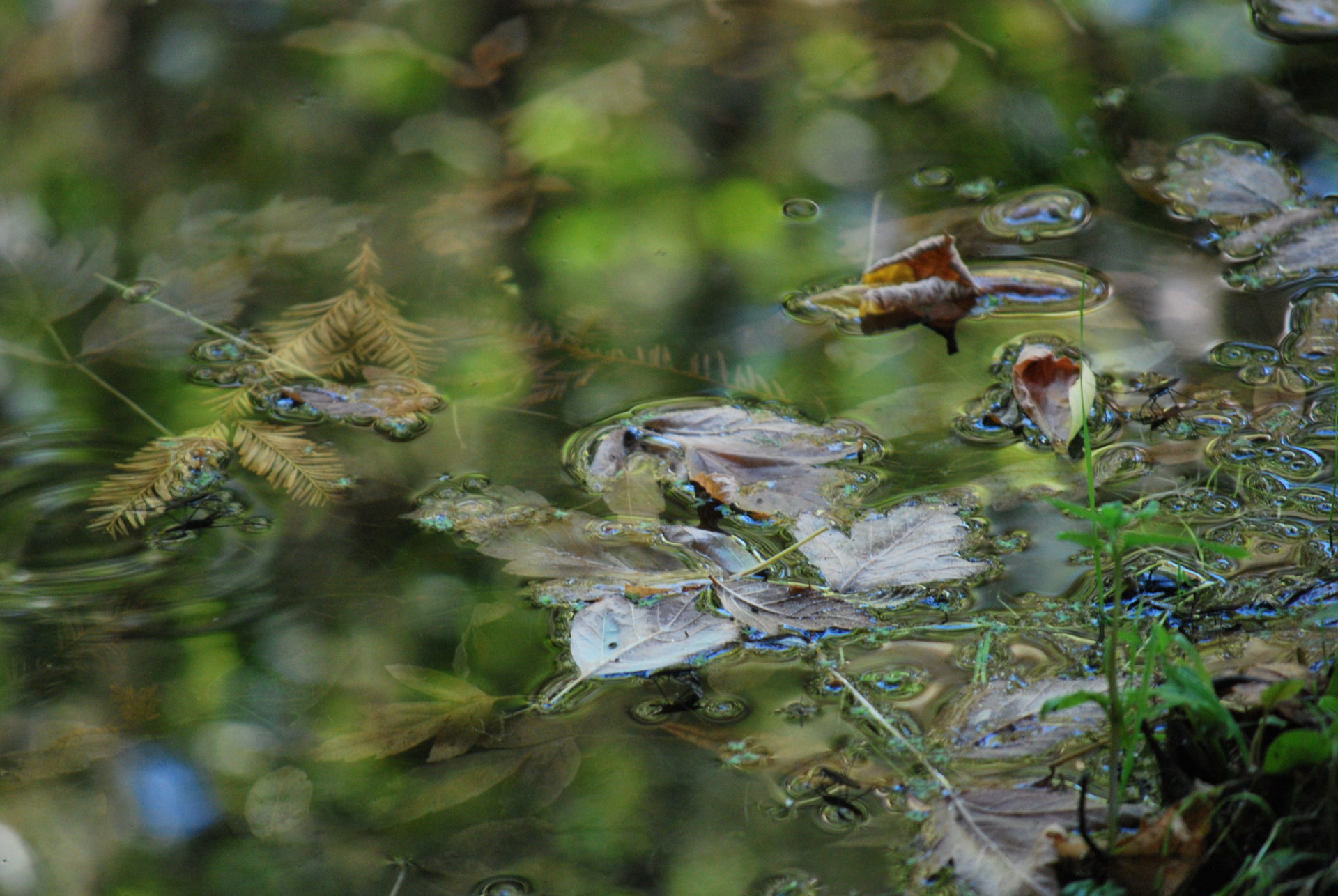Interview with Max Pugh and Marc J. Francis

Max Pugh and Marc J. Francis joined the Mindfulness Bell for a heartfelt and lively interview via Skype on July 1, 2015. Their documentary film, Walk With Me, accompanies the monastic and lay Buddhist community in its outer and inner journeys with Thich Nhat Hanh.
Interview with Max Pugh and Marc J. Francis

Max Pugh and Marc J. Francis joined the Mindfulness Bell for a heartfelt and lively interview via Skype on July 1, 2015. Their documentary film, Walk With Me, accompanies the monastic and lay Buddhist community in its outer and inner journeys with Thich Nhat Hanh. Over the course of three years, Max and Marc filmed in Plum Village, traveled with Thay and monastics to North America, and captured their journey to Vancouver, Mississippi, New York, Washington, and San Diego. Through intimate interviews and observational filming, this luminous film offers a rare insight into monastic life and the deeply personal reasons why the monks and nuns decided to leave their families and follow in Thay’s footsteps. The film is slated for international cinema release in 2016, and the filmmaking team is raising marketing and distribution funds so the film can have maximum exposure globally. For more information, visit walkwithmefilm.com. To donate, go to thichnhathanhfoundation.org and specify “Walk With Me film” under Gift Designation Notes.
Denise Nguyen, the director of the Thich Nhat Hanh Foundation, joined the interview as a deep listener, and here she offers an insightful introduction.
– Natascha Bruckner, managing editor
I’ve been fortunate to get to know Max Pugh and Marc Francis while they’ve been making the film Walk With Me. What has struck me is their deep desire to create this love letter to Thay and the monastics. I feel safe in their vision for this film. In working on other projects for our Sangha, I’ve felt people’s motivations can sometimes be opportunistic when it comes to our community, but there is no sense of that with Max and Marc, because in the process of making this film, they not only have been truly touched by our community but also have been transformed themselves.
Mindfulness is often in the news now, with many more people making their teachings heard by the world. In June 2014, Thay gave a wonderful talk in which he said mindfulness is not a tool, as it’s often portrayed in the media, but a way of life that reflects a practice of the Noble Eightfold Path. Walk With Me captures what many of us who come to the monasteries for a day or a retreat have experienced firsthand—the sincere and deep practice of Thay and the monastic community. With so much attention and interest on mindfulness these days, the opportunity for a wide audience to learn more about the simple yet inspiring lives of the monks and nuns is an important and needed contribution to the current conversation because of its focus on personal transformation through the power of mindfulness. The film will also help people see how Thay has truly embodied the teaching of the Three Jewels. While many mindfulness teachers focus only on the Buddha and the Dharma, Thay has always understood and espoused the equal importance of the Sangha. Walk With Me will show how Thay’s legacy is not only his teachings but also the beloved community he’s built and nurtured throughout the years.
Film moves and galvanizes people like no other medium. I’m excited and hopeful about the positive impact this film can have on people, inspiring them to look deeply within themselves.
– Denise Nguyen, True Moon Lamp, Chan Nguyet Dang
Natascha Bruckner: How was this film born? How did it first develop?
Max Pugh: I was on a visit to New Hamlet in February 2011, when my brother, Phap Linh, and Brother Phap Dung asked me how a documentary could be made about Plum Village and the monastic tour to the US in the fall of 2011. Phap Dung thought that a film on a group of touring monastics hadn’t been made before. Instantly, that aspect of the monastic life caught my attention because of its originality. He asked me how it might be funded and I suggested crowd funding. I don’t think the brothers knew about it so I put them onto the Indiegogo site, and an experiment was conducted over the next two months, March and April of 2011, to raise the money to start the filmmaking process. It was a successful experiment, and so I started filming with them on the first of August, and Marc joined me in California by September. That’s how the whole process was born. By the end of the 2011 American tour, we had shot some great footage, but we realized we could go much deeper if we had more time. So we reconvened with the monastics and we proposed spending time in Plum Village, too, which they agreed to.
The way the monastics worked with us was so fundamentally different from any creative process that Marc and I had ever been involved in. When you go to a meeting at Plum Village, the agenda of the meeting is not the priority. The priority is love. The priority is not business. Marc and I sometimes have to check in with each other and say we do realize this will probably never happen again, so let’s make the most of this environment, and maybe secretly that’s why we’ve taken this long!
Marc J. Francis: We found ourselves looking at four hundred or so brothers and sisters who all looked almost exactly the same. We knew that we would have to invest a considerable amount of intimate and personal time, not just to build our trust with the brothers and sisters but also to find a way to connect to their personal stories that would resonate with an international audience.
We knew we were committed to making a film that was not just for the Sangha. It is a film for the world, for people who don’t know about Thich Nhat Hanh, might not even know about Buddhism. As storytellers we are interested in talking to the mainstream, not to a niche audience. That was also why the film took a very long time. How do we find ways to not explicitly make a Dharma film? Obviously we had the teachings inside the film, but when an audience watches it, they don’t feel like they are in a Dharma talk with Thay. And that’s been our challenge right up until this day. We have invested a tremendous amount of resources and time to tell the story in that way, honoring the pace and rhythm of the Zen monastics and then finding a way to synergize that with our lives on the outside world, with other realities and practicalities to consider, which in itself has been a practice for us.
MP: I could just come in on that point Marc has made about representing the practice. I don’t know if this was part of their strategy or their thinking, but when my brother and Phap Dung first approached me, I think it was as a filmmaker; it wasn’t as a practitioner, because I wasn’t. I had gone to Plum Village for my brother’s ordination, for his Bhikshu ordination, for various big occasions, but not at all because I was interested in the practice. I wasn’t interested; I was too busy, I was enjoying my life too much. If I wanted to take a week out, I wanted to go on holiday, not on retreat! I give huge credit to both Phap Dung and my brother for never, ever saying that a condition of this filmmaking process was that I had to become a practitioner. They did say, as Thay has always insisted, that any journalist coming into the process should come to the practice center for a few days before they do an interview with him. The sheer wisdom of that I really understand now, four years down the line.
But as filmmakers, we do benefit from the outside perspective, certainly. Let’s say that we were coming into this having been ten- or fifteen-year practitioners. That wouldn’t necessarily make a worse film but it would make a very different film. It might be harder, to pick up on a point Marc was making, to present it to the wide audience, because if you’re already in it, it’s not necessarily easy to know how to communicate it anymore.
MJF: It might be worth pointing out very quickly, Max, that the privilege extended to you, not to do a retreat before being with the monks and the nuns, might be on the basis of you being a blood relative. I had to do time. [Max giggles]
MP: No, I was certainly encouraged on the first retreat in Canada.
MJF: It doesn’t matter when you’re a blood relative—you can do what you like, you get triple A access. [Max giggles] Whereas I had to do time. But this was something I was very, very attracted to anyway, so it wasn’t an issue to do retreats. It was like, “You have to do a retreat.” “Oh great, when can I start?” [Laughter] “Fantastic.” And I ended up bringing my family there on holidays over the years, so the children got to grow up in the Plum Village retreats for about three years and they still go. And the monastics come by my house when they are visiting England and we have dinner together and the children know them very well. There’s definitely a very strong sense of community and family in the making of the film through Max being the brother of Brother Phap Linh, and through my brother Nick Francis co-producing the film, as well as my family being brought to the tradition as a result of my engagement with the film.
NB: I am wondering how each of you has changed over the years, based on the work you’ve done on this film and the exposure to the practice. Could you talk about a moment when you had a turning point during the filmmaking process or reflect on how you changed in a larger way?
MJF: My moment came on the very first day of meeting Thay. I didn’t really know anything about Thich Nhat Hanh when I started this project. I’d had a vague interest in Buddhism ten years earlier but I’d never afforded the time to look deeply at it. I knew nothing really, apart from I knew Max’s brother before he became a monk and knew that he had become one. That’s as far as it went.
So I flew in to California at midnight and arrived in the mountains at Deer Park Monastery halfway through a retreat, on a Wednesday night. Found myself sleeping in the library of the monastics because there were no other beds. Woke up the next day completely jet-lagged and went down the stairs. I remember going in to breakfast. I had never done the orientation to the retreat, so I knew nothing about the rules or the regulations or the practice. I just walked in to breakfast, grabbed my bowl, slapped my porridge in, went to sit down, and started looking around. Everyone was being silent and they started making eye contact and bowing to me. I asked, oh my God, where am I? What’s going on here? I stepped outside and there were people looking out into the mountain range and some people were hugging each other and even crying. I’m going, has someone died or something?
A bell sounded and there was a Dharma talk, so I went down the steps and into the big hall. Thay did a talk. In this talk, he said one sentence that changed my life in a massive way: “The best education that you can give your children is to know yourself.” By that time, our eldest was three and there was another one coming. I was troubled with this idea of being a father, because something was lacking in my own personal sense of wisdom. So when Thay said this sentence, it was like an ambulance siren—emergency, pay attention! And then he said, “How often do you play with your children, and are you really in the moment with your children? Are you there thinking about what’s on your to-do list? If you’re thinking about your to-do list, you are actually not there. True love is to offer someone your presence and be there for them, and mindfulness is the way to get there.” From that moment, everything changed slowly, day by day, week by week. There was a complete unraveling of my sense of self and who I thought I was and how I want to live.
MP: I think my answer to that question wouldn’t single out a specific event but a more general wave of change in my life in the last four years. Going back to 2008, to my brother’s ordination, I used to feel uncomfortable in Plum Village. Anything with even a vague whiff of organization, let alone potentially religious organization, would send me running in the opposite direction. And yet after my brother made the decision to ordain, I found myself naturally supportive of him because I started a process of change in my own life in that same year, as I left living in London and decided to live here in France for family reasons. In that year, I started to become much more sensitive to his decision to become a monk.
But even in 2011, which was three years after that, I still didn’t feel very comfortable entering the different hamlets of Plum Village. I felt more comfortable outside than inside. And to say that that has changed over the last four years is a complete understatement. I now miss the atmosphere of the monasteries. I absolutely love to go back there, whether in winter or summer. The human bonds that have been made there have been profound. And also I have found myself, unconsciously at first and then very much consciously, adopting the practice over the last four years. Perhaps not all of it, perhaps aspects of it, but it has crept under my skin in a way that I would never have anticipated—a wave of becoming aware of my breath in difficult stressful times, a wave of absolutely certain vegetarianism, if not veganism—completely unthinkable four years ago. Those two things are deeply linked to compassion. If you control your breath, then you control your anger, then you control your relationships with people. Vegetarianism is a form of compassion and sensitivity that then applies itself to all sorts of other aspects of your life. So the interconnectedness of those things I am highly aware of now, to the point where I find them very, very hard to disentangle. I find it very hard sometimes to go back to the outside world once I’ve been in the Plum Village environment.

NB: Have you been tempted to join your brother as a monk?
MP: Never, no. I honestly don’t think ever, no.
MJF: I am working on it. [Laughter]
MP: There are certain things I think I can say with total confidence, and that is one of them. Our personalities are very different and I think I would be a terrible monk. It’s such a fundamental life course that only the best, only those who absolutely can commit to it should go into that. My brother is one of those people and I’m certainly not. My respect for what he’s done and for his brothers and sisters, though, is without limits.

NB: I’d love to hear a story about a joyful or memorable moment that each of you had during the filmmaking process.
MJF: For me there’ve been so many joyful moments. It is hard to single out any of them really—joyful moments without the camera and joyful moments with the camera. Camping with my daughter, looking up at the stars at night ‘til about 2:00 a.m., was a joyful moment. With the camera, there are moments of little miracles that happen that you don’t expect. The film is made up of little miracles, encounters that you can never, ever plan for—being in a Dharma sharing or capturing an emotional sharing of some sort. We’ve felt really privileged to have access to those stories and to capture them for the film.
NB: Thank you, Marc. [Marc leaves the interview for another engagement.]
MP: There have been some incredibly moving moments in this filmmaking process. As a filmmaker you become part of a Dharma sharing circle for a week, and then even though you have a camera, you’re given this extraordinary generosity and treated absolutely as an equal. It’s as if the camera by then disappears; it simply doesn’t exist. That is, frankly, unprecedented. The way that we’ve been received as filmmakers in people’s inner lives and the intimacy along this journey have been extraordinary.
NB: The process sounds wonderfully transformative. Did you have a structure or a story in mind at the very beginning? Were there things that changed during the process?
MP: Yes. We’ve hinted at it before in the conversation, but to clarify—the brothers’ suggestion was a road movie, a tour movie. Once we had been filming over the summer and fall of 2011, we saw the potential for that but also we wanted to go deeper, we wanted more. We then thought the most coherent approach would be a film about the siblings—a brother’s film about a brother. Then naturally his brothers and sisters in the community would form part of that picture but it would be more around him. When we took that back to the monastics, they encouraged us to look at the whole community rather than focusing on Phap Linh. And that’s when the final structure, the approach was set.
The structure that we have been working with since then has been the life of monastics across four seasons. The film falls into four seasons, with nature producing this kind of arc of change but the wheel always coming back, and with that change framing the monastics’ lives.
NB: The collaborative relationship between you two seems like a harmonious interbeing. It sounds like you were friends before the process started?
MP: Marc studied Mandarin Chinese and I was studying politics and filmmaking. We lived together in the final year of university after Marc came back from China, the 1998-99 academic year. In very late 1999, we talked about making a film together, and it took twelve years for that film to happen. We did work together in the twelve years in between. I cut a trailer for Marc’s and his brother’s first feature film, which was at Sundance. We then did projects together for various charities and organizations around the world. It’s been a very symbiotic, flowing relationship, but we were waiting for the subject to come up that would unite us not just professionally but creatively, and that happened in 2011 with this film.
We don’t need to speak to understand each other. It’s a completely unconditional relationship. We bicker like siblings at times. But there’s something underneath; we know we will never actually offend each other. We’ll never actually step over the line because it’s unconditional, which is very, very precious in a creative relationship. We are also co-directing. The film director is a very ego-driven role and we’ve practiced enormously nonattachment and aspects of Thay’s teaching, in trying to find collaborative space. You can’t have two egos smashing their heads together; it’s disruptive.
NB: Is there anything else you’d like to share?
MP: A note of profound thanks from Marc and me, and not just for the financial support we’ve had from the Sangha in order to keep going over the last four years and spend as much time on this project as we’ve been able to. At times we’ve been able to actually push other work out of the way, which is a real privilege, to concentrate on this. Each donation is like an act of love, not just support but love. We very much feel that. The way that we’ve been received on retreat over the years in every country that we’ve been to also has touched us deeply, and the way people have opened their hearts to us.
Transcribed by Martina McNaboe. Edited by Janelle Combelic and Natascha Bruckner.

